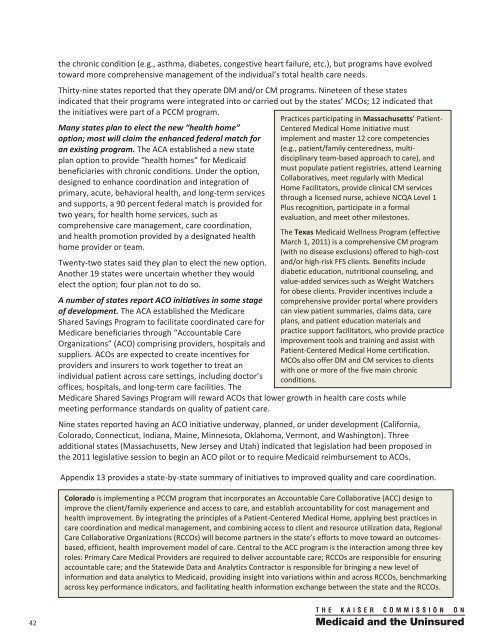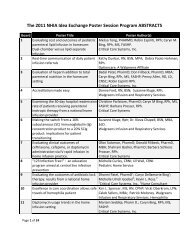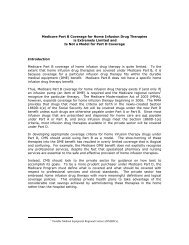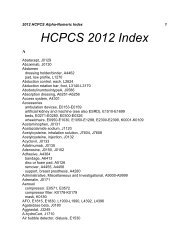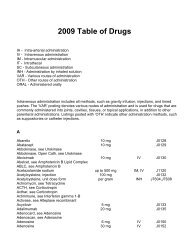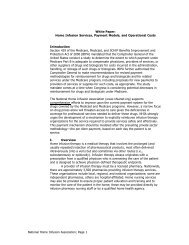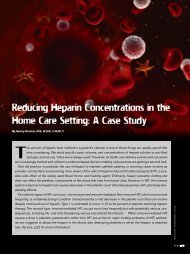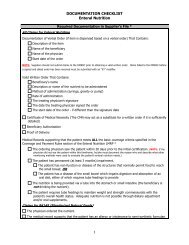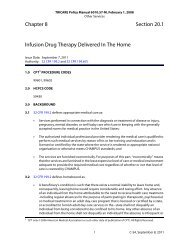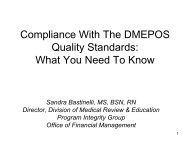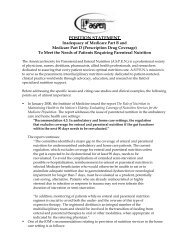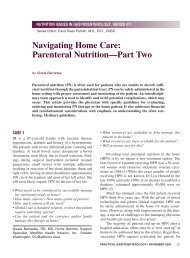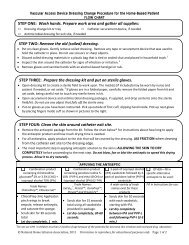Kaiser Family Foundation Survey on State Medicaid Managed Care ...
Kaiser Family Foundation Survey on State Medicaid Managed Care ...
Kaiser Family Foundation Survey on State Medicaid Managed Care ...
- No tags were found...
You also want an ePaper? Increase the reach of your titles
YUMPU automatically turns print PDFs into web optimized ePapers that Google loves.
the chr<strong>on</strong>ic c<strong>on</strong>diti<strong>on</strong> (e.g., asthma, diabetes, c<strong>on</strong>gestive heart failure, etc.), but programs have evolvedtoward more comprehensive management of the individual’s total health care needs.Thirty-nine states reported that they operate DM and/or CM programs. Nineteen of these statesindicated that their programs were integrated into or carried out by the states’ MCOs; 12 indicated thatthe initiatives were part of a PCCM program.Many states plan to elect the new “health home”opti<strong>on</strong>; most will claim the enhanced federal match foran existing program. The ACA established a new stateplan opti<strong>on</strong> to provide “health homes” for <strong>Medicaid</strong>beneficiaries with chr<strong>on</strong>ic c<strong>on</strong>diti<strong>on</strong>s. Under the opti<strong>on</strong>,designed to enhance coordinati<strong>on</strong> and integrati<strong>on</strong> ofprimary, acute, behavioral health, and l<strong>on</strong>g-term servicesand supports, a 90 percent federal match is provided fortwo years, for health home services, such ascomprehensive care management, care coordinati<strong>on</strong>,and health promoti<strong>on</strong> provided by a designated healthhome provider or team.Twenty-two states said they plan to elect the new opti<strong>on</strong>.Another 19 states were uncertain whether they wouldelect the opti<strong>on</strong>; four plan not to do so.A number of states report ACO initiatives in some stageof development. The ACA established the MedicareShared Savings Program to facilitate coordinated care forMedicare beneficiaries through “Accountable <strong>Care</strong>Organizati<strong>on</strong>s” (ACO) comprising providers, hospitals andsuppliers. ACOs are expected to create incentives forproviders and insurers to work together to treat anindividual patient across care settings, including doctor’soffices, hospitals, and l<strong>on</strong>g-term care facilities. ThePractices participating in Massachusetts’ Patient-Centered Medical Home initiative mustimplement and master 12 core competencies(e.g., patient/family centeredness, multidisciplinaryteam-based approach to care), andmust populate patient registries, attend LearningCollaboratives, meet regularly with MedicalHome Facilitators, provide clinical CM servicesthrough a licensed nurse, achieve NCQA Level 1Plus recogniti<strong>on</strong>, participate in a formalevaluati<strong>on</strong>, and meet other milest<strong>on</strong>es.The Texas <strong>Medicaid</strong> Wellness Program (effectiveMarch 1, 2011) is a comprehensive CM program(with no disease exclusi<strong>on</strong>s) offered to high-costand/or high-risk FFS clients. Benefits includediabetic educati<strong>on</strong>, nutriti<strong>on</strong>al counseling, andvalue-added services such as Weight Watchersfor obese clients. Provider incentives include acomprehensive provider portal where providerscan view patient summaries, claims data, careplans, and patient educati<strong>on</strong> materials andpractice support facilitators, who provide practiceimprovement tools and training and assist withPatient-Centered Medical Home certificati<strong>on</strong>.MCOs also offer DM and CM services to clientswith <strong>on</strong>e or more of the five main chr<strong>on</strong>icc<strong>on</strong>diti<strong>on</strong>s.Medicare Shared Savings Program will reward ACOs that lower growth in health care costs whilemeeting performance standards <strong>on</strong> quality of patient care.Nine states reported having an ACO initiative underway, planned, or under development (California,Colorado, C<strong>on</strong>necticut, Indiana, Maine, Minnesota, Oklahoma, Verm<strong>on</strong>t, and Washingt<strong>on</strong>). Threeadditi<strong>on</strong>al states (Massachusetts, New Jersey and Utah) indicated that legislati<strong>on</strong> had been proposed inthe 2011 legislative sessi<strong>on</strong> to begin an ACO pilot or to require <strong>Medicaid</strong> reimbursement to ACOs.Appendix 13 provides a state-by-state summary of initiatives to improved quality and care coordinati<strong>on</strong>.Colorado is implementing a PCCM program that incorporates an Accountable <strong>Care</strong> Collaborative (ACC) design toimprove the client/family experience and access to care, and establish accountability for cost management andhealth improvement. By integrating the principles of a Patient-Centered Medical Home, applying best practices incare coordinati<strong>on</strong> and medical management, and combining access to client and resource utilizati<strong>on</strong> data, Regi<strong>on</strong>al<strong>Care</strong> Collaborative Organizati<strong>on</strong>s (RCCOs) will become partners in the state’s efforts to move toward an outcomesbased,efficient, health improvement model of care. Central to the ACC program is the interacti<strong>on</strong> am<strong>on</strong>g three keyroles: Primary <strong>Care</strong> Medical Providers are required to deliver accountable care; RCCOs are resp<strong>on</strong>sible for ensuringaccountable care; and the <strong>State</strong>wide Data and Analytics C<strong>on</strong>tractor is resp<strong>on</strong>sible for bringing a new level ofinformati<strong>on</strong> and data analytics to <strong>Medicaid</strong>, providing insight into variati<strong>on</strong>s within and across RCCOs, benchmarkingacross key performance indicators, and facilitating health informati<strong>on</strong> exchange between the state and the RCCOs.4242 00


